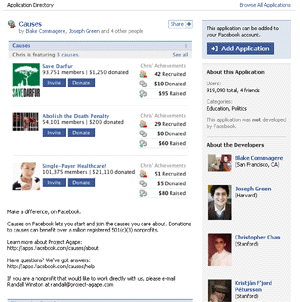When Facebook Platform launched at the end of May , the move was met with surprise and delight from online marketers and software developers who have been hoping for a way to access the social network's huge audience of college-aged users. The Platform allows software developers to design custom applications people can install for their profiles. These applications have a wide range of uses, including advertising, fundraising, and apps that are just for fun.
I've seen the popularity of some of these applications first-hand, with many people in my circle of friends using the Graffiti App, which allows users to scribble on their friends' walls, and photo slideshow applications. The popularity of Facebook platform has been formally documented: CNET reports that some 1,500 applications have been created since the launch of the Platform. Installation of some of these applications has expanded incredibly quickly, with "some of the most popular [going] from zero to 850,000 users in three days". Dave Morin, director of Facebook Platform told CNET that "This is unprecedented in the history of the Internet".
However, will this popularity be long-lived or short-term? One Facebook app developer, Amit Gupta, argues that Facebook users may run into "application fatigue", causing the popularity of Facebook Platform to be more of a fad than anything else. I tend to agree with Gupta. Whereas MySpace users have shown constant interest in using widgets and other creative options on their profiles since the network's inception, Facebookers have relied on the system for its communication features rather than for the system's flexibility, which up until the last couple of weeks, has been non-existent.
The tendency for people to join groups on Facebook for various causes has been proven in the past through politics, with people grouping together for candidates or issues. But just as it's a question whether Facebook Apps will be a long-term tool, it's also a question whether people are ready to give money and/or be sold to through the social network. Thus far, it hasn't been proven whether Facebook membership translates into fundraising dollars.
 To judge how well some applications are doing at raising money, we did a little experiment. We checked out one of the fundraising applications, called Causes. The app is by Project Agape and can be found by doing a simple search in the applications directory. The way it works is that the application offers a directory of non-profit causes to which Facebook users can start a membership and donate money online. Causes are grouped into categories, making them easier to browse through. The directory was too large for us to research all of the causes, but to get a general idea of how fundraising through this app was progressing, we took a sample of some of the causes and compared their membership to fundraising history. Currently, there are 9 categories of Causes. We examined the first 25 causes (alphabetically) for each category, a total of 225 causes.
To judge how well some applications are doing at raising money, we did a little experiment. We checked out one of the fundraising applications, called Causes. The app is by Project Agape and can be found by doing a simple search in the applications directory. The way it works is that the application offers a directory of non-profit causes to which Facebook users can start a membership and donate money online. Causes are grouped into categories, making them easier to browse through. The directory was too large for us to research all of the causes, but to get a general idea of how fundraising through this app was progressing, we took a sample of some of the causes and compared their membership to fundraising history. Currently, there are 9 categories of Causes. We examined the first 25 causes (alphabetically) for each category, a total of 225 causes.
What we found is that membership for these causes is through the roof. For the 225 causes we researched, there are a total of 615,415 members, an average of 2,735 members per group. The "international" category, which includes groups like "Save Darfur" and "Fight Aids" has the most members, 206,277 (that's an average of 8,251 members per group. The "religion" category, which includes groups like "Share the Gospel" and "Stop Islam Hijacking" had the fewest members, a total of 4,959 (an average of 198 members per group).
Despite the huge membership stats, fundraising stats are lagging far behind. In total, $30,752 were raised by all the groups we checked out. This may seem like a lot, but this averages to just $0.05 per member or $138 per group. I think the key here is that becoming a member of a group or cause on Facebook is really easy and requires limited to no action. This membership is, in most cases, merely a stamp on someone's profile that helps connect users to other like-minded people. Beyond that, group membership on Facebook doesn't really mean much. Making donations, on the other hand, actually requires college- and high school-aged people to contribute funds. In most cases, this age group doesn't have a lot of spare cash on hand, especially for causes on a network which people have gotten used to using for free.
While I think Facebook applications like the work by Project Agape is a great idea and helps people to get a voice for their political/social concerns. However, I don't expect these groups to have a lot of success raising funds on Facebook.
What do you think? How will the new Facebook Platform affect online fundraising for non-profits?
Take a look at our research data here.
Sign up today to have our latest posts delivered straight to your inbox.